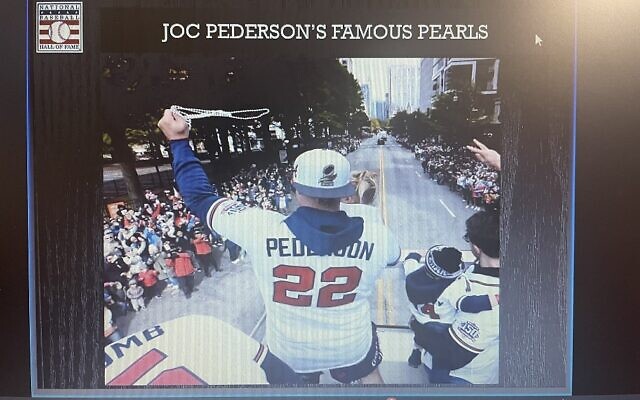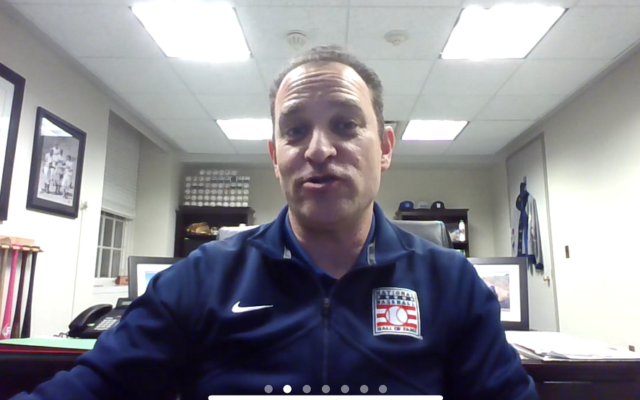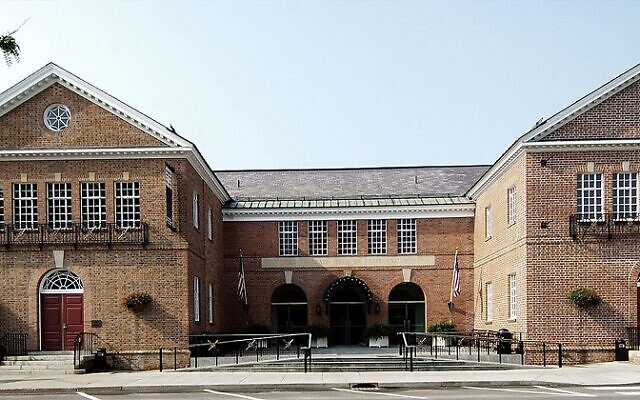A Stroll Through the ‘Jewish’ Baseball Hall of Fame
Hundreds of fans Zoomed into the event to learn about the careers of baseball’s Jewish Hall of Famers.

Cooperstown, the bucolic hamlet nestled in the cornfields of New York’s Mohawk Valley, is a treasure trove of baseball history. It is in Cooperstown that the National Baseball Hall of Fame, with its collection of prized artifacts and dazzling displays, resides.
The Hall is truly nirvana for the game’s devoted fanbase. Unfortunately, the Hall’s quaint location (the nearest major airport in Albany is over an hour’s drive away) precludes many would-be visitors from ever walking through its doors.
Lou Rosenberg, a longtime director of Corporate Sales for the Los Angeles Clippers and current executive director of the Greater Los Angeles branch of the Jewish National Fund-USA, was well aware of such a predicament facing diehard baseball fans, particularly those on the West Coast. So, if he couldn’t bring hundreds of fans to Cooperstown, maybe Rosenberg could bring Cooperstown to them.
With the goal of getting baseball fans nationwide a “taste of the Hall of Fame,” this winter Rosenberg emailed Josh Rawitch, the newly appointed president of the National Baseball Hall of Fame, about holding a virtual tour with a strong focus not only on the Hall’s four Jewish members (Hank Greenberg, Sandy Koufax, Marvin Miller, Bud Selig), but also the contributions made by Jewish ballplayers throughout the game’s storied history.

Rawitch, a longtime active member of Los Angeles’s Jewish community who grew up in the San Fernando Valley (he attended Hebrew school with San Francisco Giants skipper Gabe Kapler), was more than willing to host a Zoom event. Once the event was publicized, the outpouring of public support for a virtual tour of the Hall, followed by a Q&A with its new president, was significant.
“We’re two years into using Zoom as part of our lives and the fact that almost 300 people signed up in, like, 48 hours shows that there is a lot of interest in this,” says Rosenberg, whose brush with Jewish baseball Hall of Fame history came as a 19-year-old pharmacy employee making a delivery to Hank Greenberg’s doorstep in west L.A.
The hundreds of fans who Zoomed into the event naturally learned a great deal about the careers of baseball’s two Jewish Hall of Famers, Greenberg and Koufax — whose statue will finally be unveiled later this summer at Dodger Stadium — as well as those of former Commissioner Bud Selig, former Pittsburgh Pirates owner Barney Dreyfuss and former MLB Players Association executive director Marvin Miller (inducted into the Hall posthumously last year).

There was also a more recent angle to Rawitch’s presentation: the momentous role Jewish ballplayers Max Fried, Joc Pederson and Alex Bregman played in last fall’s World Series, one that has been well-chronicled as the most Jewish of all-time. In fact, following Game 6 last October, Rawitch was able to acquire the spikes Fried wore during the series-clinching win for the Hall of Fame.
“I did spend time putting together a dozen items that I think people will find interesting,” Rawitch says, a week before the actual event. “One of the great things about the Hall of Fame is that a lot of our collection is actually visible to the public online. Any items that I talk about during this appearance, people will be able to actually go online themselves and look it up on our website.”
While the primary focus of the virtual tour was to enlighten fans about the historic contributions made by Jewish ballplayers, Peter Kurz, the Israeli National Baseball team’s general manager, chimed in on JNF-USA’s current project to develop a baseball stadium in Israel by the end of 2022.
The stadium will host the baseball team’s workouts as they gear up for the 2023 World Baseball Classic (they participated in the 2017 edition) and those by the Israeli National Softball team when it prepares for the annual Women’s European Softball Championship.
Indeed, JNF-USA has good reason to invest in the future of baseball in Israel. Unbeknownst to the masses, Jewish contributions to the sport transcend the groundbreaking accomplishments made by the aforementioned quartet of HOF inductees. According to Rawitch, who, after serving as the Los Angeles Dodgers’ PR executive, worked as the Arizona Diamondbacks’ senior vice president of Content and Communications, “there are hundreds of other items probably that are in some way or another donated by a Jewish player.”
But on this night, thanks to pandemic-inspired technology, hundreds of baseball lifers, many of whom perhaps may never get to visit Cooperstown in the flesh, were able to lay eyes on the Hall’s two most sacred Jewish-related artifacts: Hank Greenberg’s 300th homerun baseball and Sandy Koufax’s high school glove.
“What we all learned during the last couple years of the pandemic is just how easy it is to do this sort of programming,” says Rawitch, who over the next few months will be busy preparing for the 2022 Induction Weekend (slugger David Ortiz is the headliner this year). Cooperstown’s annual marquee event will be in-person for the first time since 2019.
“It’s a little strange that we’re all still doing so many Zooms when the world is kind of coming back to normal,” Rawitch said. “In a case like this, where you can’t have everybody come to Cooperstown, one of my goals in my new role is continuing to bring Cooperstown out into the world.”
- Sports
- Baseball
- David Ostrowsky
- Cooperstown
- Hall of Fame
- Lou Rosenberg
- los angeles clippers
- Jewish National Fund-USA
- Josh Rawitch
- Zoom
- virtual tour
- Hank Greenberg
- Sandy Koufax
- Marvin Miller
- Bud Selig
- Gabe Kapler
- Barney Dreyfuss
- Max Fried
- Joc Pederson
- Alex Bregman
- Pittsburgh Pirates
- San Francisco Giants
- MLB
- World Series
- Los Angeles Dodgers
- Arizona Diamondbacks
- David Ortiz



comments